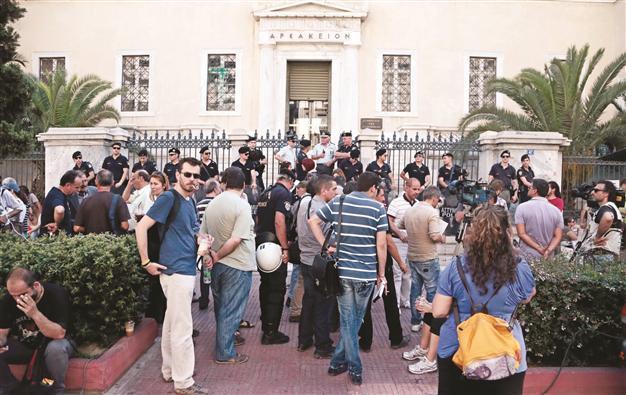Greek coalition faces crisis on state TV row
ATHENS - Reuters

Fired employees of ERT protest the closure of the Greek broadcaster. AP photo
The smallest party in Greece’s ruling coalition pulled out of the government on June 21 after a row over the abrupt closure of the state broadcaster, leaving Prime Minister Antonis Samaras with a tiny majority in Parliament.
Democratic Left lawmakers voted to withdraw their ministers from Samaras’s government but have yet to decide whether to offer external support in parliamentary votes to keep Greece’s international bailout on track, party officials said.
“The country doesn’t need elections,” party leader Fotis Kouvelis said in a statement. “The Democratic Left insists on its reform policy and will continue to seek and demand solutions within the European reality.”
The moderate leftist party’s departure is major blow to the conservative Samaras, who is left with a three-seat majority in Parliament, making it tougher to pass unpopular reforms demanded by foreign lenders and emboldening the hard left opposition. In a defiant address to Greeks after midnight, Samaras said he was ready to press ahead without the leftists if necessary.
“I want us to continue together as we started but I will move on either way,” Samaras said in a televised statement following the collapse of three-party talks on the future of the ERT radio and television station.
Coincides with new hitch“Our aim is to conclude our effort to save the country, always with a four-year term in our sights.” The row coincided with a new hitch in Greece’s EU-IMF bailout with the discovery of a potential funding shortfall due to the reluctance of some euro zone central banks to roll over their holdings of Greek government bonds.
The latest crisis began 10 days ago when Samaras abruptly yanked the ERT public radio and television station off air and fired its 2,600 workers, sparking an outcry from his two allies, unions and journalists.
Calling it a “sinful” and “wasteful” hotbed of political patronage, Samaras said the move was necessary to hit public sector layoff targets set by Greece’s EU and IMF lenders.
